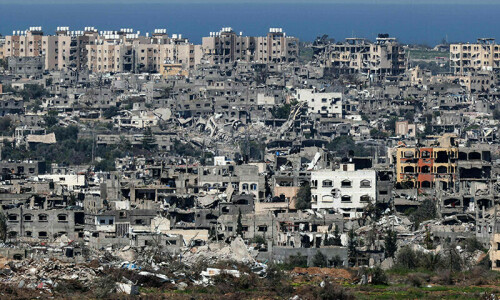DUBAI: Iranians voted for a new parliament on Friday, in an election seen as a test of the clerical establishment’s legitimacy at a time of growing frustration over economic woes and restrictions on political and social freedoms.
Supreme Leader Ayatollah Ali Khamenei, who has called voting a religious duty, was among the first to cast his vote in Iran.
“Vote as soon as possible ... today the eyes of Iran’s friends and ill-wishers are on the results. Make friends happy and disappoint enemies,” Khamenei said on state television.
The election is the first formal measure of public opinion after anti-government protests in 2022-23 spiralled into some of the worst political turmoil since the 1979 Islamic Revolution.
Partial results expected today; state media portrays ‘good’ turnout
Iran’s rulers need a high turnout to repair their legitimacy, badly damaged by the unrest. But official surveys suggest only about 41pc of eligible Iranians will vote. Turnout hit a record low of 42.5pc in the 2020 parliamentary election, while about 62pc of voters participated in 2016.
State TV, portraying a general enthusiastic mood with live coverage from across Iran interspersed with patriotic songs, aired footage of people braving snow to vote in some towns and villages. Several people told state TV that they were voting “to make the supreme leader happy”.
Over 15,000 candidates were running for the 290-seat parliament. Partial results may appear by Saturday.
Activists and opposition groups were distributing the hashtags #VOTENoVote and #ElectionCircus widely on the social media platform X, arguing that a high turnout would legitimise the Islamic Republic.
Officials said the participation was “good”, state media reported, but witnesses said most polling centres in Tehran and several other cities were lightly attended. A two-hour extension of voting announced by state TV was followed shortly by another two-hour extension — taking the close of voting to 18.30 GMT — to allow late-comers to cast ballots.
“I am not voting for a regime that has restricted my social freedoms. Voting is meaningless,” said teacher Reza, 35, in the northern city of Sari.
Imprisoned Nobel Peace Prize laureate Narges Mohammadi, a women’s rights advocate, has called the election a “sham”.
Crisis and crackdown
The parliament, dominated for over two decades by political hardliners within the religious Islamic Republic, has negligible impact on foreign policy or a nuclear programme that Iran says is peaceful but the West says is aimed at making nuclear arms — issues determined by Khamenei.
With heavyweight moderates and conservatives staying out and reformists calling the election unfree and unfair, the contest is essentially among hardliners and low-key conservatives who proclaim loyalty to Islamic revolutionary ideals.
Published in Dawn, March 2nd, 2024















































Dear visitor, the comments section is undergoing an overhaul and will return soon.